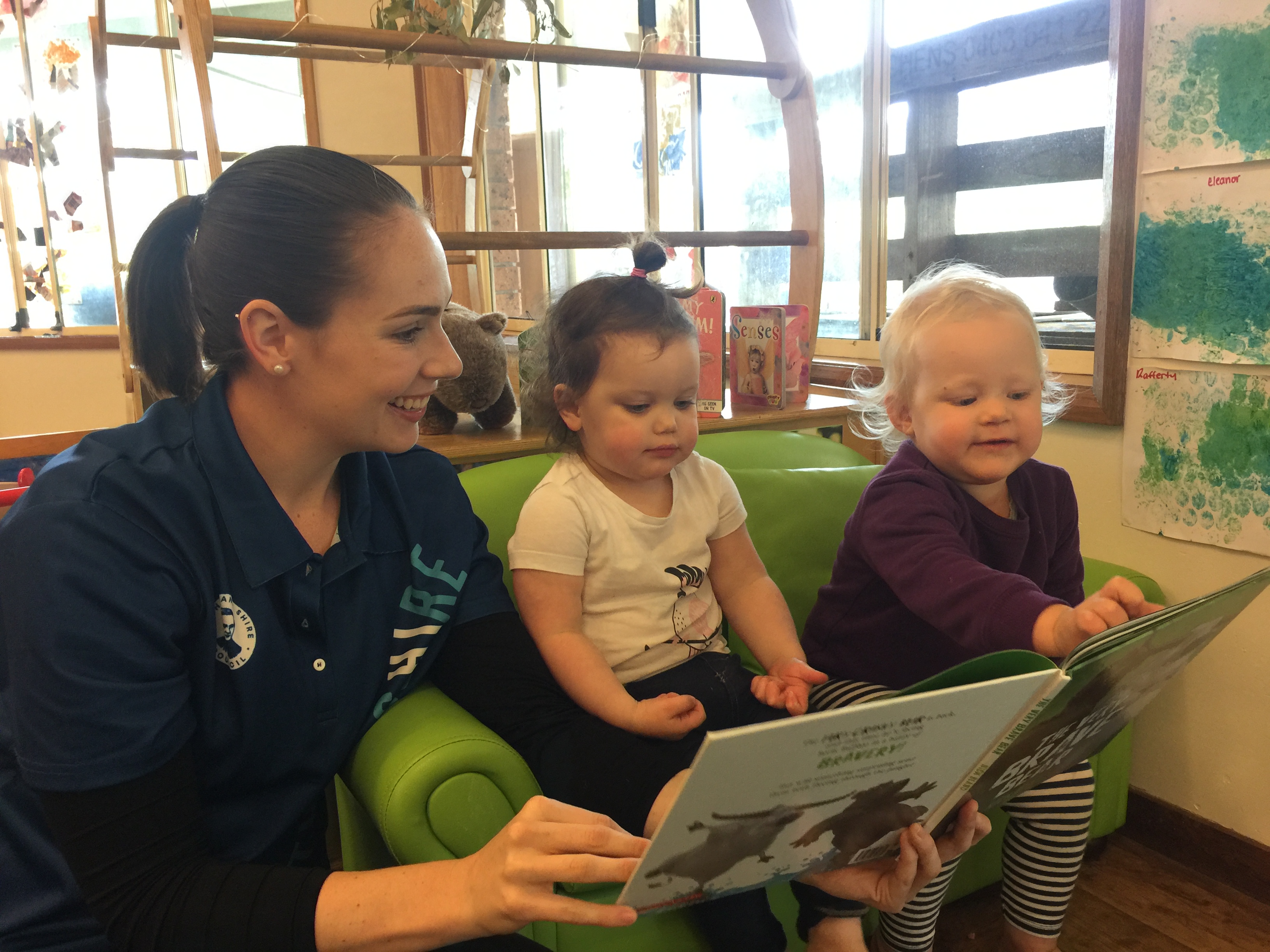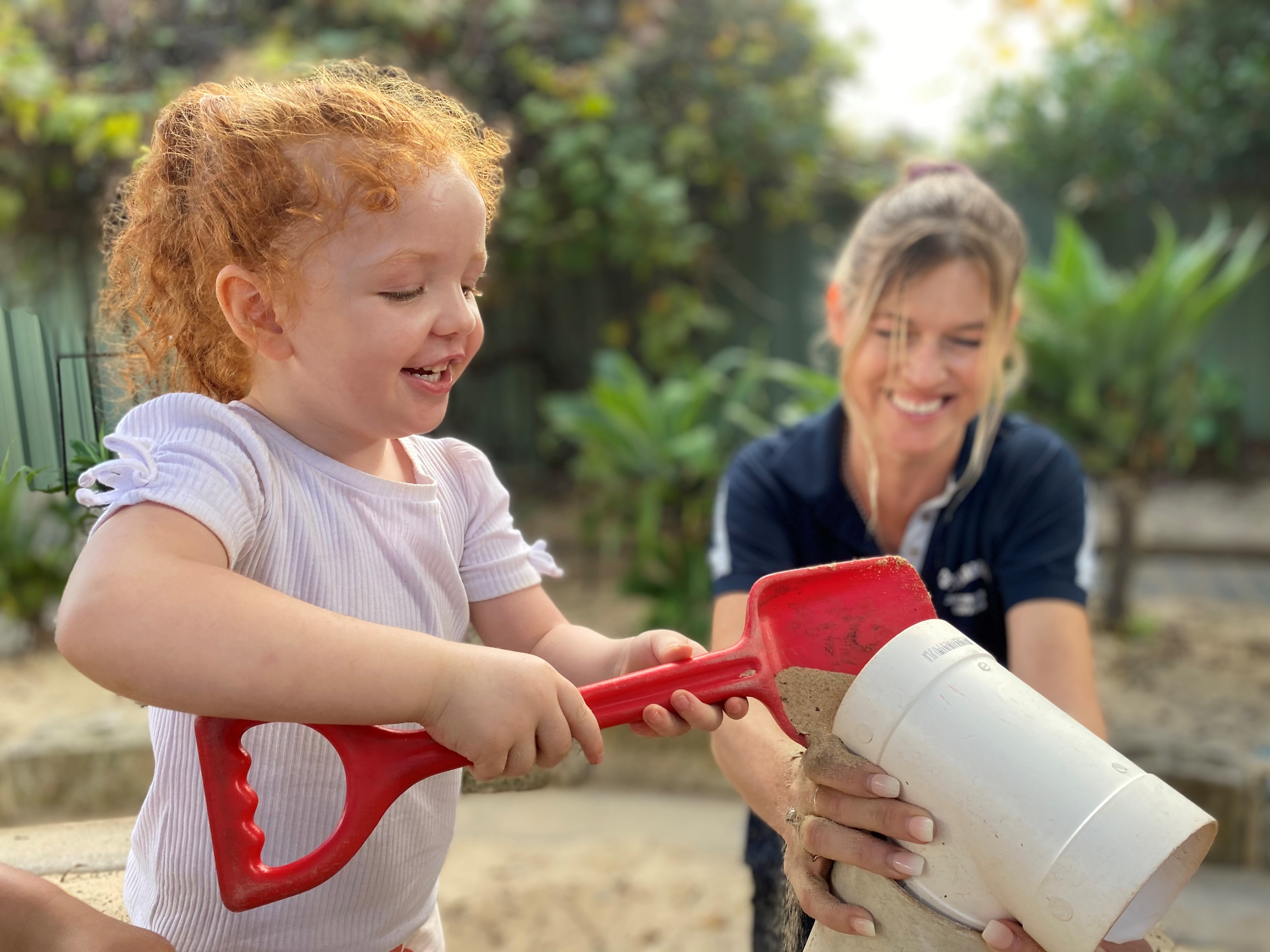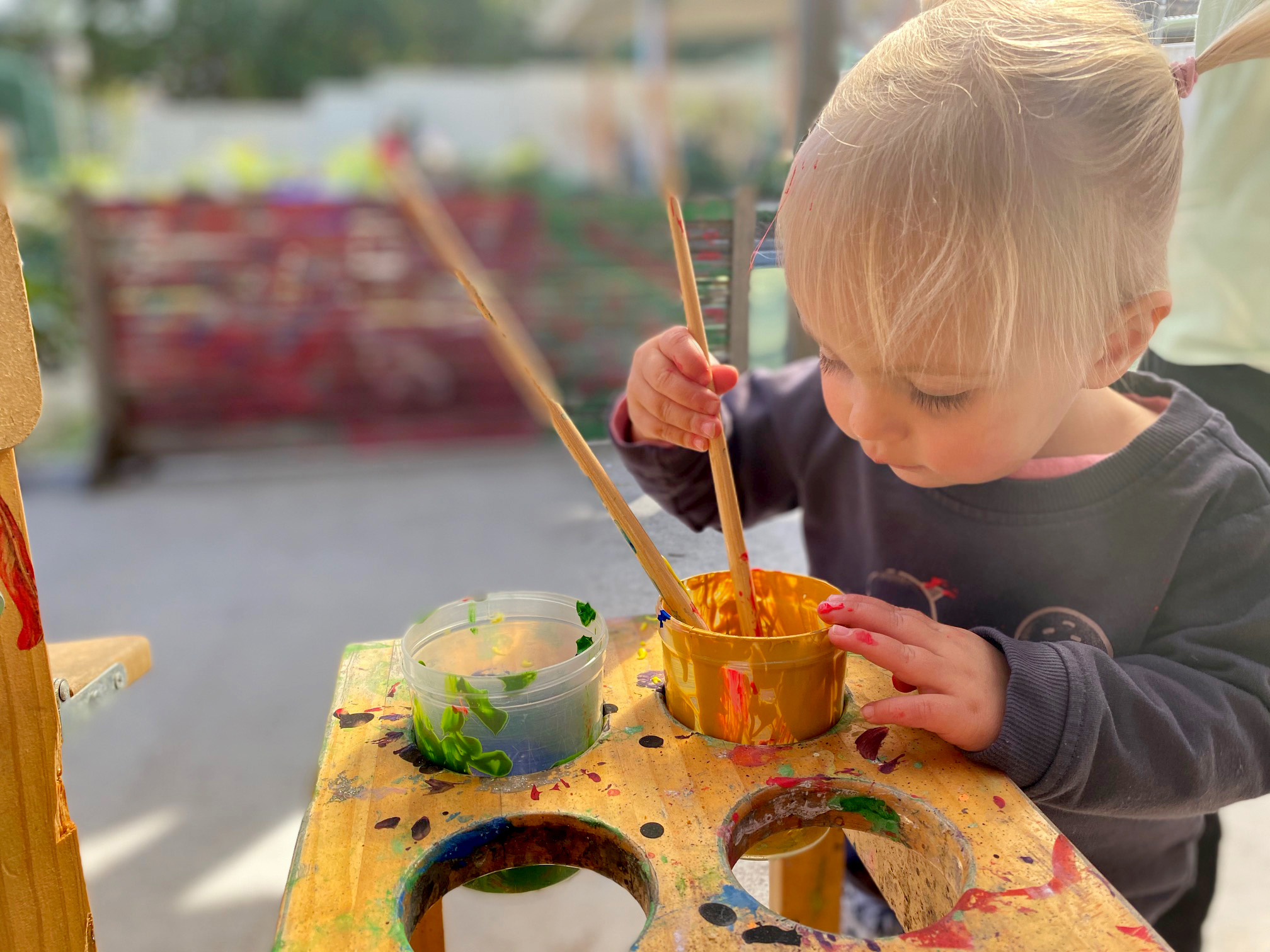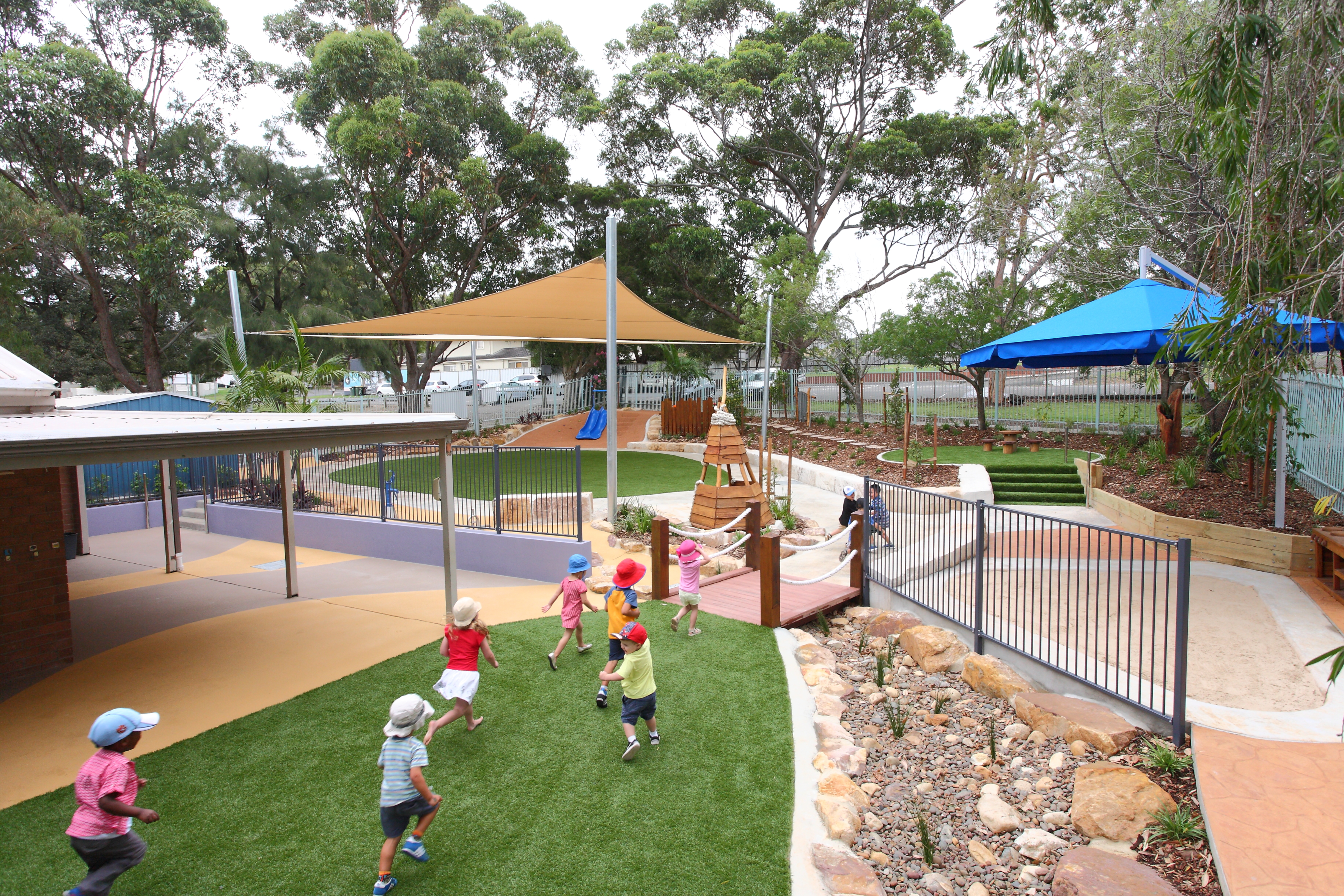


We understand that choosing the right early education and care service for your child is a big decision. You need to know:
- Who will care for your baby?
- How will the Educators get to know your child?
- How will your baby settle in?
- What will your baby learn and do?
Learn more about our services so that you can make the right choice for your child and family.
Getting to know you and your baby
We will build a relationship with your baby and family before your child starts care.
During your baby’s time with us, we will provide open, two-way communication with you to understand:
- your baby’s sleep, feeding and daily routine
- your baby’s unique personality and their likes and dislikes.
When your baby is with us, we will mirror their home routine to the greatest extent possible.
Partnering with you
We will partner with you every step of the way.
Each day we share detailed information about your child’s:
- feeding
- sleeping
- nappy changes
- learning activities
- disposition.
Smaller scale centres
Our centres are smaller in scale than some other early education and care services. This means fewer numbers of babies and more personalised care.
Because we’re small, every Educator will know you and your child well.
Our spacious infant rooms are calm and picturesque. We offer quality spaces for play and sleep.
Our experienced teams
We are experts in baby care routines and infant development. Our Educators are committed to ensuring your baby enjoys their days in care, full of many cuddles, smiles, songs and stories.
Your baby’s learning
Your baby will have opportunities to grow, learn and enjoy new experiences through programs including:
- music and movement
- literacy experiences
- activities to build gross motor skills
- socialising with other children
- age-appropriate developmental experiences
Infancy is an important time for your baby's development. We focus on their progress in these areas:
- forming strong connections and relationships.
- mobility (crawling, standing and, for some infants, walking) and fostering their ‘independence’.
- language development - learning to express their wants and needs and understand communication.
Toddlers are moving through a crucial phase of development. Our programs support their needs in a nurturing and supportive educational environment.
Getting to know your child
We take the time to get to know each child. This includes their unique personality, preferences and interests. Rest assured that every Educator at our centre will know your toddler very well.
Supporting your toddler’s development
We help toddlers to build a wide range of important skills.
This includes supporting toddlers to:
- Build receptive language (processing and understanding what they hear and acting on this)
- Build expressive language (communicating and expressing needs, learning new words)
- Encourage resilience (bounce back from 'challenges' and try again)
- Take part in a group
- Follow instructions (e.g. building from a single task to multi-step tasks)
- Develop a sense of identity (who am I and where do I fit in?)
- Form friendships and learn to share
- Develop emotional regulation skills
- Increase their attention span
- Achieve toileting and feeding independence
- Develop core strength and coordination.
Toddler educational programs
Our educational programs are play-based. We strengthen each toddler's development through a range of daily activities such as:
- Creative arts and sensory play
- Puzzles and games (e.g. simple instructional games such as ‘Simon Says’)
- Reading stories
- Music, dancing and singing
- Role play
- Construction/destruction areas
- Outdoor play and physical movement to build core strength and learn to jump and climb. During outdoor play children also learn to assess risks e.g. ‘Can I jump from here?’.
Strong connections with you and your child
We build strong relationships with every child. This ensures they feel supported, connected and happy.
We work in close partnership with parents on their child’s specific needs. Is there an area of focus you would like us to concentrate on? What are your toddler’s current interests?
We encourage and value parent input into their child’s curriculum.
Our quality preschool program includes a deliberate combination of intentional teaching and spontaneous learning. It also reflects the children’s interests and each child’s learning goals.
Inspiring children to learn
We create environments which foster a preschooler's love of learning. Because when we inspire a child to learn, they will thrive in every aspect of their development.
They will:
- ask questions
- process new information
- try new things
- be happy to share and collaborate
- develop friendships
- join in games, and
- know they are a part of a community of learning.
Early Years Learning Framework
There is only one government approved learning framework for children under school age. It’s called the Early Years Learning Framework.
Our creative preschool program follows this Australian Government framework.
Play-based preschool program
We tailor our program to suit your child’s developmental stage and milestones. It fosters the following areas:
- Language (learning new words, following directions, sharing news and stories etc).
- Cognitive growth (concepts such as time, advanced memory games)
- Pre-literacy
- Pre-numeracy
- STEAM experiences (science, technology, engineering, arts and maths)
- Fine motor skills (pincer grip, cutting, pasting, holding a pencil, drawing, writing name)
- Gross motor skills (hopping, jumping, skipping)
Social and emotional skills
Social and emotional skills are also important for starting primary school. We focus on your child's development in these areas:
- Emotional resilience (self-regulating emotions, expressing emotions in a way that others would expect)
- Self-care skills (e.g. caring for belongings, tying shoelaces, toileting by themselves)
- Making and maintaining friendships
- Starting conversations with others
- Problem solving skills
- Developing resilience
- Sharing and taking turns
- Compromising, cooperating and working in a group with other children.
- Learning to adapt to changes in routines
- Knowing when and how to ask for help
- Empathy and caring for others.
Our program in action
Every day the children enjoy experiences and activities to build their strengths and promote a life-long love of learning.
It might include:
- helping to take care of our centre's pets
- creating their own self portrait
- making sushi
- collaborating with others to make Anzac Day wreaths
- participating in wheelchair races to learn about inclusion
- putting on a concert
- tending to the centre’s veggie patch
- visiting the local primary school
- learning a second language
- engaging in science experiments
- or enjoying our vast and well-resourced outdoor spaces with their friends.
It is a privilege for us to support them in their journey and witness their learning milestones.
Transition to school
We consult with parents on school readiness and transition to school.
We enjoy strong connections with nearby primary schools. We attend school events during the year to familiarise children with primary school. Transition to school visits also take place for children starting primary school.
Our lunch box and school uniform days are very popular with the older children! Their little fingers can master the skill of opening lunch boxes and containers. They wear their new school uniform for the day with pride.
Our 'pretend play' areas are well stocked with all the school essentials. Uniforms, school bags, lunchboxes and writing materials are ideal for role playing. They help the children to prepare for big school.
We value every child. Inclusion is at the heart of our philosophy and practice. We want to ensure that all children in our care take part in our programs.
Our philosophy
We will speak with you to learn as much as possible about your child.
We look at a range of factors when considering an enrolment. These include:
- your child’s needs
- our centre facilities
- staff training and experience
- access to suitable support services
- suitability of the centre environment.
Enrolling your child
At the time of enrolment, we work with you to develop an individual support plan for your child. This includes strategies to strengthen your child's developmental and learning journey.
In some situations, we seek additional assistance from inclusion support agencies and apply for inclusion support funding. If our application for funding is successful, we may be able to employ an additional educator. The funding does not provide 1:1 support for your child but rather provides an extra educator in the play space to overarchingly overcome inclusion barriers for all children.
Your role
When applying for care, it is imperative that families provide accurate and current information about their child. This includes providing detail about diagnoses, additional needs, any challenging behaviours and medical needs.
Your child’s enrolment may be at risk if you do not provide us with all relevant information.
Families applying for care are required to be committed to open, ongoing communication to ensure we meet your child’s needs.
Our role
We will provide families with:
- accurate and timely information about your child
- relevant information from health professionals and support agencies
- time for Educators to meet your child and family before starting care
- equal opportunities to make decisions about your child’s learning program
- opportunities to share your family’s culture, knowledge and skills. This helps all children to appreciate and welcome similarities and differences.
- regular opportunities to share your expectations and views of our inclusive program.
We build strong partnerships with families. We communicate often about your child’s progress. Strong two-way communication always leads to better outcomes for children.
Starting care
It’s important your child feels happy and comfortable in our care. Before starting care, we spend time getting to know your child and family.
We encourage you to enjoy ‘play dates’ at the centre. This will help you to get to know our teachers and some of the other children. It’s also an ideal time for us to learn about your child’s routine, interests and strengths.
Communication app
We communicate with parents each day via a safe and secure electronic platform called Xplor Home.
You'll receive timely insights into your child's day and see details about group learning experiences through daily reflections, photos and videos. Educators and parents can also share information with each other.
Infant communication
As a parent you need daily information about your baby’s time in care. This includes feeding, sleeping and nappy change details, and an insight into your baby’s day.
We speak with parents each day about their baby’s development and any changes in their routine.
Educator/parent meetings
We offer parents the opportunity to meet with us at specific times of the year. We discuss your child’s progress, learning and development.
Parents are also welcome to arrange meetings outside of these times.
Have your say in the children’s curriculum
Family input into the children’s learning program is important. It can be as simple as sharing your child’s current interests with us.
Sibling time
It’s important for siblings to spend some time together during their day in care. Our flexible routines promote sibling connections.
For example, an older child may spend time in the nursery with a younger sibling to enjoy meal time together.
We charge a standard daily fee across all of our Early Education Centres. The fee varies depending on your child's age. The fees cover many inclusions such as meals and cloth nappies.
Child Care Subsidy
Most families are eligible for Child Care Subsidy from the Federal Government. This helps families pay for childcare.
If you are eligible to receive this financial support, the Federal Government will pay the subsidy direct to Council. You (the family) must pay the remaining gap (Council’s fee minus the subsidy). This is referred to as ‘out of pocket’ costs.
Find out your Child Care Subsidy entitlement at Services Australia.
Centre fees
Below are the full paying fees for the 2024/25 financial year.
To calculate your daily out of pocket costs, subtract your Child Care Subsidy entitlement that applies to your child:
- $164.00 per day for age birth-2 years (minus your Child Care Subsidy entitlement)
- $154.00 per day for age 2-3 years (minus your Child Care Subsidy entitlement)
- $148.00 per day for age 3-5 years (minus your Child Care Subsidy entitlement)
Our Early Education Centres are not-for-profit. Parent fees and government grant funding covers the cost of our services. It also covers centre upgrades such as new playgrounds.
What’s included in your fees
Meals
Our onsite cooks prepare fresh, healthy meals for the children every day. We provide:
- breakfast
- morning and afternoon tea
- lunch
- late afternoon snack
- milk (cow’s, rice and soy milk)
We make all meals in each centre's commercial kitchen. We know what goes in them, and we know what the children love.
Our cooks are also skilled at catering to allergies, cultural and dietary needs.
Below are some of the children's favourite meals. Some of these might surprise you!
- Mexican bean vegetable soup
- Vegetable and tuna pasta bake
- Veggie and tofu fried rice
- Chicken and green vegetable curry
Free cloth nappy service
Parents can choose to use our free cloth nappy service for their baby or toddler. The modern cloth nappies are reusable and professionally cleaned.
This service saves many tonnes of landfill each year.
We follow the Educator-to-child ratios set by the Australian Government.
- Under age 2: 1 Educator to 4 children
- Age 2-3 years: 1 Educator to 5 children
- Age 3-5 years: 1 Educator to 10 children
Maintaining ratios
We maintain ratios at all times during the day.
We employ Educators to cover breaks, leave and attendance at professional development. They are familiar faces who know the children and their routines well.
Some Educators are employed via government funding, to support children with additional needs. These Educators are over and above the regulatory staffing numbers. They support all children at the centre.
Educator qualifications
At least half of the Educators working in our centres are Diploma qualified or above. All Educators hold an early childhood qualification.
Our highly qualified and experienced teams are an important indicator of quality care.
We operate all our services to a high standard. Our centres are safe and compliant with industry standards and national regulations.
Quality practice team
Children's Services has its own expert Quality Practice team who visit our centres often to review and oversee our processes and practices.
This is how we know we are meeting all quality and safety standards.
This is also how we make changes and improvements to benefit the children.
Our commitment to safety guides every decision we make.
National Quality Standards
The NSW Department of Education assesses all early education and care services on a periodic basis. They examine seven quality areas. Each service receives a quality rating. Quality ratings are available to customers.
All Council centres operate at or above the industry’s National Quality Standards. This is due to our robust and industry-leading quality practice program.
Hygiene
Hygiene is a top priority in our Early Education Centres.
Here are some of our routine practices to protect the children in our care:
- Cleaners undertake a thorough three hour clean of every centre every night.
- We clean ‘high touch’ surfaces throughout the day (e.g. children’s tables).
- We clean and disinfect the children’s bathrooms twice daily.
- The children wash their hands throughout the day, including before and after eating. Hand washing is key to reducing the spread of infections.
- We clean and disinfect nappy change areas after every use.
- Children and Educators who show any signs of illness do not attend our centres.
Separation anxiety is one of the biggest concerns for parents who are placing their child into care for the first time.
What age is it likely to occur? How can I minimise its likelihood? How can I support my child?
Part of natural development
Separation anxiety is part of a child’s natural and normal development. Regardless, it’s very difficult for parents to experience. No one ever wants to see their child upset.
It can occur when a parent physically separates from their child, such as leaving them in the care of others.
It can start from age eight months and peaks at around 14-18 months old. It tends to cease gradually during early childhood.
Varying degrees
Separation anxiety can occur in varying degrees, from mild to chronic:
- A child may be distressed at drop off, however with cuddles, reassurance and distraction they naturally assimilate into the centre’s routine. Most children who experience separation anxiety fall into this category.
- A child may also become upset on and off during the course of the day, however the child’s Educators are able to resettle them, again with support and reassurance.
- A child is chronically upset and there are no glimpses of a decrease in their distress. These occurrences tend to be rare.
Children who experience separation anxiety may suddenly cry when they see their parent at pick up time. This is totally normal. Even when the child has had a great day, they remember why they were upset in the morning and these feelings of separation anxiety resurface in a flood of emotions when they see you.
Preparing for Care
The good news is, there are very specific things both parents and early education and care providers can do to support every child starting care.
Children’s Services
Our Educators work in close partnership with families to foster every child’s transition into care, with the goal of making it as smooth as possible.
We meet with families to learn about their child’s likes and dislikes. During play visits, we set up activities of interest to the child, to help them engage with their new environment and feel a sense of belonging.
We liaise closely with families of children who are experiencing separation anxiety, to jointly develop strategies to support their child’s specific needs.
It’s also important to us that we remain in close contact with families during the day to let them know how their child is going.
We also encourage parents to call us as often as they need. We want parents to feel reassured about their child’s progress. We will always be honest if we feel their child needs further support.
Parents
- Arrange a series of visits to the service to allow your child to become familiar with their new environment. Give them time to get to know their Educators, some of their peers and the environment, along with engaging in the routine (e.g. placing bag in locker, washing hands upon arrival, walking into room to say hello).
- Talk positively about ‘kindy’ (or the name you will refer to the service as at home) and activities your child may do there. Children will very quickly pick up on their parent’s distress or negative feelings.
- Let your child bring one of their favourite items with them from home, such as a soft toy or blanket, to help them feel safe and secure. You may also like to send in a family photo, so your child can see their family whenever they need to during the day.
- Decide on a drop off routine and let your child know in advance what to expect and what will happen when they arrive at kindy. This will help your child feel secure when they arrive. Here is an example: “When we get to Kindy, we’ll put on your sunscreen and then we’ll put your bag in your locker. We will say hello to your teachers and after that, I will leave and you will stay at Kindy with your teachers. I will come back to pick you up after afternoon tea.”
- Follow through with your plan – it’s important to be consistent with your routine when dropping your child off.
- If you prefer, you may decide to drop off quickly and give your child a hug and kiss and hand your child to one of our Educators who will take the time to calm and soothe your child before assisting them to transition into play.
- It is always better to hand your child to us (even through their tears). Handing your child to us – rather than us ‘taking’ your child from you - tells the child you trust us and it is okay to come to us while still missing you. We appreciate this can be difficult for you as well as your child.
- Stay calm and try to look happy and relaxed. When a child is crying, many times as parents, we apologise for leaving. This unintentionally tells your child you’re not comfortable with them staying at kindy. Rather than saying, “I’m sorry, Mummy has to leave now” try “It’s time for Daddy to leave now. Have a fun day! I will see you after afternoon tea.”
- Say goodbye and leave - these are the most important two steps to a successful drop off.
- Say goodbye: it may seem best to quietly leave the room when your child is busy playing and skip the goodbyes. Your child is happy, focused and confident you are nearby. When he or she realises you are gone, panic may set in. In your child’s mind, you didn’t leave but rather disappeared, which may cause them to become anxious.
- Time to leave: it’s best not to prolong the goodbye. If you’re not leaving immediately, do not say goodbye. Once you’ve said goodbye, the best outcome is to leave promptly and with a smile.
- The Kissing Hand (Audrey Penn)
- Maisy goes to playschool (Lucy Cousins)
- First day at playschool (Vivianne French)
- Lenny goes to nursery school (Ken Wilson-Max)
- Read stories - there are many books available that can help you and your child talk about their new environment. We suggest any of the following (available via Sutherland Shire Libraries):
Experience tells us that with lots of gentle encouragement, cuddles, praise and practice, children will gradually settle into their new environment. Our goal is for every child is to thrive, be happy and feel a sense of belonging within our community of learning.
Please read our terms and conditions here.
